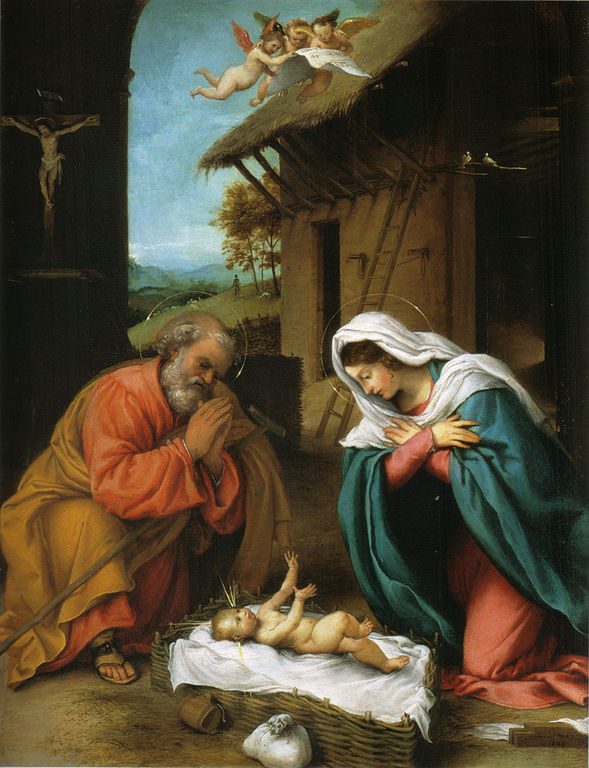***
see: Luke 1:26-56; 2:1-20,35]
To Joseph betrothed; descended from King David’s line.
Obedient to Moses’ and Yahweh’s holy laws were we;
Seeking in all our ways and acts to follow the Will Divine.
* * *
The glorious angel Gabriel suddenly one day appeared;
Speaking solemnly in troubling and confusing ways.
With words causing great awe, confusion, even fear:
Why hail me as “O favored one” and “full of grace”? *
* * *
I was told that I was chosen to bear a special Son,
A great man: the righteous “Son of the Most High.”
Inheritor of David’s throne and higher than everyone;
Reigning over Jacob, with His Father’s kingdom nigh.
* * *
The Holy Spirit was to “overshadow” me like a cloud;
My precious child was all-holy; God’s only begotten.
“What did that mean?”, I wondered; yet not out loud;
Trembling, pondering a message not soon forgotten.
* * *
To Gabriel I said I was the lowly “handmaid of the Lord”;
Whatever God wanted, I was happy and willing to do.
I resolved to “let it be to me according to your word”;
I embraced the luminous vision of God’s holy gospel anew.
I visited my kinswoman Elizabeth, in Judaean hills far away;
The prophet John the Baptist did leap for joy in her womb.
He would prepare the way for Jesus on that wonderful Day:
The healer of the blind, Who raised the dead from the tomb.
Calling me blessed among women, carrying a blessed child.
I was even the mother of her “Lord,” — is what she said;
I kept these things in my heart, astonished all the while.
Rejoicing that He saved me by grace from a certain fate.
Marveling at how He had always filled His people’s needs,
From generation to generation: Abraham up to that date.
No inn or house in sight; just a cold, dusty (but dry) cave.
Even the beasts “understood”, and were so gentle and kind;
The Lord of Lords was now with us, to seek and to save.
After hearing loud heavenly choruses of great peace and joy —
The King of kings, David’s heir, and carpenter’s son of Galilee.
God had become man: the eternal Creator was a baby boy!
Though my soul be pierced; by His death we’d reach heaven.
But I accepted this: God’s love and mercy made me so glad;
For this divine plan my body and soul I have joyfully given.Written on 10 December 2008
*Completely optional explanatory footnote!:
Most translations today for Luke 1:28 have “favored one.” But “full of grace” is also permissible. The great Baptist Greek scholar A.T. Robertson commented on this verse as follows:
“Highly favoured” (kecharitomene). Perfect passive participle of charitoo and means endowed with grace (charis), enriched with grace as in Ephesians. 1:6, . . . The Vulgate gratiae plena “is right, if it means ‘full of grace which thou hast received‘; wrong, if it means ‘full of grace which thou hast to bestow‘” (Plummer).
(Word Pictures in the New Testament, Nashville: Broadman Press, 1930, six volumes; Vol. II, 13; see this passage in the online version)
Kecharitomene has to do with God’s grace, as it is derived from the Greek root, charis (literally, “grace”). Thus, in the KJV, charis is translated “grace” 129 out of the 150 times that it appears.
Greek scholar Marvin Vincent noted that the Catholic John Wycliffe and Protestant William Tyndale (English translators before the KJV) both rendered kecharitomene in Luke 1:28 as “full of grace” (though he thinks that was “wrong”) and that the literal meaning was “endued with grace” (Word Studies in the New Testament, Grand Rapids, Michigan: Eerdmans, 1946, four volumes, from the 1887 edition [New York: Charles Scribner’s Sons], Vol. I, 259; see the passage online).
Likewise, well-known Protestant linguist W.E. Vine, renders kecharitomene as “to endue with Divine favour or grace” (An Expository Dictionary of New Testament Words, Old Tappan, New Jersey: Fleming H. Revell Co., four volumes-in-one edition, 1940, Vol. II, 171; see the online version for the word “grace”).














